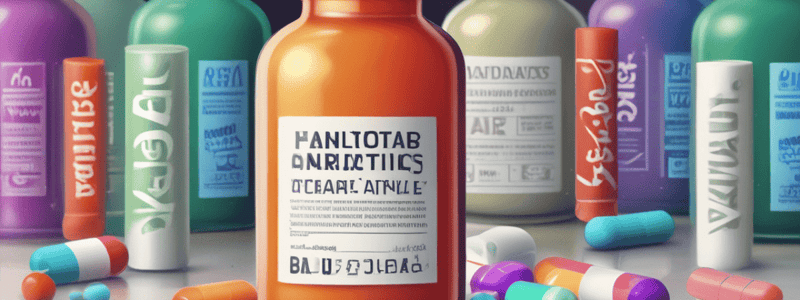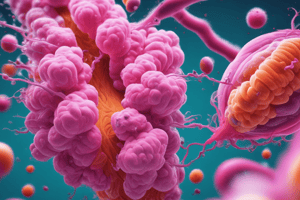Podcast
Questions and Answers
What enables carbapenems to access the periplasm?
What enables carbapenems to access the periplasm?
- Ability to bind to PBPs
- Resistance to -lactamases
- Presence of outer membrane porin (correct)
- Production of efux pumps
Which of the following is NOT a mechanism of carbapenem resistance?
Which of the following is NOT a mechanism of carbapenem resistance?
- Overproduction of efux pumps
- Ability to inhibit efux pumps (correct)
- Loss of production of outer membrane porin
- Production of altered PBPs
What is the result of carbapenems binding to PBPs?
What is the result of carbapenems binding to PBPs?
- Increased susceptibility to other antibiotics
- Enhanced efflux pump activity
- Increased production of -lactamases
- Bacterial cell death (correct)
Which bacteria is susceptible to developing resistance by acquiring mutations?
Which bacteria is susceptible to developing resistance by acquiring mutations?
What is a characteristic of the -lactamases produced by some bacteria?
What is a characteristic of the -lactamases produced by some bacteria?
What was the first commercially available carbapenem in the United States?
What was the first commercially available carbapenem in the United States?
What is the name of the fungus from which the first cephalosporins were derived?
What is the name of the fungus from which the first cephalosporins were derived?
What is the term used to categorize cephalosporins?
What is the term used to categorize cephalosporins?
What is the common characteristic of cephalosporins and penicillins?
What is the common characteristic of cephalosporins and penicillins?
What is the name of the author who wrote about the story of penicillin discovery?
What is the name of the author who wrote about the story of penicillin discovery?
Which type of bacteria is first-generation cephalosporins ineffective against?
Which type of bacteria is first-generation cephalosporins ineffective against?
What is the title of the journal where Donowitz and Mandell published their research on beta-lactam antibiotics?
What is the title of the journal where Donowitz and Mandell published their research on beta-lactam antibiotics?
What is the primary reason first-generation cephalosporins lack activity against gram-negative bacteria?
What is the primary reason first-generation cephalosporins lack activity against gram-negative bacteria?
What is the name of the book that Petri wrote about penicillins, cephalosporins, and other beta-lactam antibiotics?
What is the name of the book that Petri wrote about penicillins, cephalosporins, and other beta-lactam antibiotics?
What is the name of the authors who wrote about piperacillin/tazobactam?
What is the name of the authors who wrote about piperacillin/tazobactam?
Which of the following bacteria is susceptible to first-generation cephalosporins?
Which of the following bacteria is susceptible to first-generation cephalosporins?
What is the structure of cephalosporins composed of?
What is the structure of cephalosporins composed of?
What is the primary difference between cephamycins and true cephalosporins?
What is the primary difference between cephamycins and true cephalosporins?
Which type of bacteria do first-generation cephalosporins have moderate to poor activity against?
Which type of bacteria do first-generation cephalosporins have moderate to poor activity against?
What is the main advantage of the side chains of first-generation cephalosporins?
What is the main advantage of the side chains of first-generation cephalosporins?
What type of bacteria are Streptococcus pyogenes and Viridans streptococci?
What type of bacteria are Streptococcus pyogenes and Viridans streptococci?
Which of the following bacteria is not susceptible to fifth-generation cephalosporins?
Which of the following bacteria is not susceptible to fifth-generation cephalosporins?
What is a rare side effect of cephalosporins?
What is a rare side effect of cephalosporins?
Which of the following is a characteristic of fifth-generation cephalosporins?
Which of the following is a characteristic of fifth-generation cephalosporins?
What type of bacteria are Haemophilus influenzae and Neisseria spp.?
What type of bacteria are Haemophilus influenzae and Neisseria spp.?
Which of the following is not an example of an anaerobic bacterium?
Which of the following is not an example of an anaerobic bacterium?
What is a common side effect of cephalosporins?
What is a common side effect of cephalosporins?
Which of the following bacteria are susceptible to fifth-generation cephalosporins?
Which of the following bacteria are susceptible to fifth-generation cephalosporins?
What is the circled component in the structure of telavancin?
What is the circled component in the structure of telavancin?
What is the type of molecule shown in Figure 5-18?
What is the type of molecule shown in Figure 5-18?
Which of the following functional groups is NOT present in the structure of vancomycin?
Which of the following functional groups is NOT present in the structure of vancomycin?
What is the functional group attached to the phosphorus atom in the structure of glycopeptides?
What is the functional group attached to the phosphorus atom in the structure of glycopeptides?
What is the common functional group present in both vancomycin and telavancin?
What is the common functional group present in both vancomycin and telavancin?
What is the difference between the structures of vancomycin and telavancin?
What is the difference between the structures of vancomycin and telavancin?
What is the site of action for macrolides in bacterial cells?
What is the site of action for macrolides in bacterial cells?
Which of the following is a mechanism of resistance to macrolides?
Which of the following is a mechanism of resistance to macrolides?
Which type of bacteria have difficulty with macrolide penetration and accumulation?
Which type of bacteria have difficulty with macrolide penetration and accumulation?
What is the effect of macrolides on bacterial protein production?
What is the effect of macrolides on bacterial protein production?
Which gene in Streptococcus pneumoniae encodes an efflux pump, contributing to macrolide resistance?
Which gene in Streptococcus pneumoniae encodes an efflux pump, contributing to macrolide resistance?
What is the consequence of methylation of the ribosome binding site in bacteria?
What is the consequence of methylation of the ribosome binding site in bacteria?
Which of the following is a common characteristic of macrolide resistance?
Which of the following is a common characteristic of macrolide resistance?
What is the target site for macrolides in bacterial cells?
What is the target site for macrolides in bacterial cells?
What is the primary mechanism of action of rifamycins?
What is the primary mechanism of action of rifamycins?
Why are rifamycins often used in combination with other agents?
Why are rifamycins often used in combination with other agents?
What is a characteristic of rifampin?
What is a characteristic of rifampin?
What is a use of rifampin?
What is a use of rifampin?
Why is rifabutin preferred over rifampin in individuals with HIV infection?
Why is rifabutin preferred over rifampin in individuals with HIV infection?
What is a consequence of rifamycin resistance?
What is a consequence of rifamycin resistance?
What is the target of rifamycins in bacterial cells?
What is the target of rifamycins in bacterial cells?
What is the common structure of rifamycins?
What is the common structure of rifamycins?
Aminoglycosides are active against which of the following types of bacteria?
Aminoglycosides are active against which of the following types of bacteria?
What is the mechanism of bacterial resistance to aminoglycosides that prevents the accumulation of the antibiotic in the cytosol of the bacterium?
What is the mechanism of bacterial resistance to aminoglycosides that prevents the accumulation of the antibiotic in the cytosol of the bacterium?
Which of the following bacteria is NOT susceptible to aminoglycosides?
Which of the following bacteria is NOT susceptible to aminoglycosides?
What is the effect of efflux pumps on aminoglycoside activity?
What is the effect of efflux pumps on aminoglycoside activity?
Aminoglycosides are used synergistically against which of the following bacteria?
Aminoglycosides are used synergistically against which of the following bacteria?
What is the mechanism of action of aminoglycosides?
What is the mechanism of action of aminoglycosides?
Which of the following bacteria is susceptible to aminoglycosides due to its Gram-negative cell wall?
Which of the following bacteria is susceptible to aminoglycosides due to its Gram-negative cell wall?
What is a common characteristic of aminoglycosides?
What is a common characteristic of aminoglycosides?
Flashcards are hidden until you start studying
Study Notes
Antibiotic Basics for Clinicians
- Cephalosporins are named after the fungus Cephalosporium acremonium, which was the source of the first members of this class of antibiotics.
Cephalosporins
- Cephalosporins are categorized by "generation" since agents in each generation have similar spectra of activity.
- Each cephalosporin is composed of a nucleus with two side chains.
- They are useful in the treatment of infections caused by many strains of Staphylococcus aureus.
- First-generation cephalosporins:
- Cannot bind the PBPs of MRSA and MRSE or many highly penicillin-resistant Streptococcus pneumoniae.
- Are ineffective against L. monocytogenes and the enterococci.
- Have limited activity against aerobic and facultative gram-negative bacteria.
- Have moderate to poor activity against anaerobes, intracellular bacteria, and spirochetes.
- Second-generation cephalosporins:
- Are divided into two groups: the true cephalosporins (e.g., cefuroxime) and the cephamycins (e.g., cefotetan and cefoxitin).
- Cephamycins are derivatives of a parent compound originally isolated from the bacterium Streptomyces lactamdurans.
Carbapenems
- Carbapenems are adept at gaining access to the periplasm, resisting destruction by β-lactamases, and binding to PBPs to cause bacterial cell death.
- Resistance to carbapenems occurs when bacteria:
- Overcome the advantageous aspects of these antibiotics.
- Acquire mutations that result in loss of production of the outer membrane porin used by carbapenems to gain access to the periplasm.
- Overproduce efflux pumps that limit accumulation of the drugs in the periplasmic space.
- Produce altered PBPs that do not bind these carbapenems.
- Acquire the ability to produce extremely powerful β-lactamases that are capable of cleaving carbapenems.
Imipenem
- Imipenem was the first commercially available carbapenem in the United States.
Fifth-Generation Cephalosporins
- Have activity against:
- Gram-positive bacteria (e.g., Streptococcus pyogenes, viridans streptococci, Streptococcus pneumoniae, Staphylococci).
- Gram-negative bacteria (e.g., Escherichia coli, Klebsiella pneumoniae, Proteus spp., Haemophilus influenzae, Neisseria spp., some Enterobacteriaceae).
- Anaerobic bacteria (e.g., some Clostridium spp.).
Toxicity
- Cephalosporins have a relatively favorable safety profile.
- Rarely cause immediate hypersensitivity reactions consisting of rash, urticaria, or anaphylaxis.
Glycopeptides
- Structure of glycopeptides:
- Vancomycin and telavancin are examples of glycopeptides.
- Telavancin has a lipophilic decylaminoethyl side chain.
Macrolides
- Consist of a large cyclic core called a macrocyclic lactone ring
- Ring is decorated with sugar residues
- Bind tightly to the 50S subunit of the bacterial ribosome, blocking the exit of newly synthesized peptides
- Function similarly to aminoglycosides, targeting ribosomes and preventing protein production
Mechanisms of Macrolide Resistance
- Inhibition of drug entry and accumulation
- Enzyme-mediated ribosome binding site alteration (e.g., methylating the 50S ribosome)
- Mutation of the ribosome binding site
Aminoglycosides
- Also active against certain mycobacteria species (e.g., Mycobacterium tuberculosis and Mycobacterium avium complex)
- Have a similar structure with an aromatic nucleus linked by an aliphatic "handle"
- Active against various bacteria (Table 6-4)
Rifamycins
- Act by inhibiting bacterial RNA polymerase
- Nestle deep into the DNA/RNA tunnel of RNA polymerase, sterically blocking elongation of nascent mRNA molecules
- Resistance develops relatively easily due to single mutations in the bacterial gene encoding RNA polymerase
- Frequently used in combination regimens for the treatment of mycobacterial infections (Table 6-2)
Rifampin
- Used along with other antibiotics to treat staphylococcal infections
- Effective as monotherapy for prophylaxis against Neisseria meningitidis and Haemophilus influenzae
- Most potent inducer of the cytochrome P-450 system
Rifabutin
- Favored over rifampin in individuals being treated for tuberculosis and HIV infection
- Inhibits the cytochrome P-450 system to a lesser degree than rifampin or rifapentine, making it easier to administer with antiretroviral agents
Studying That Suits You
Use AI to generate personalized quizzes and flashcards to suit your learning preferences.




